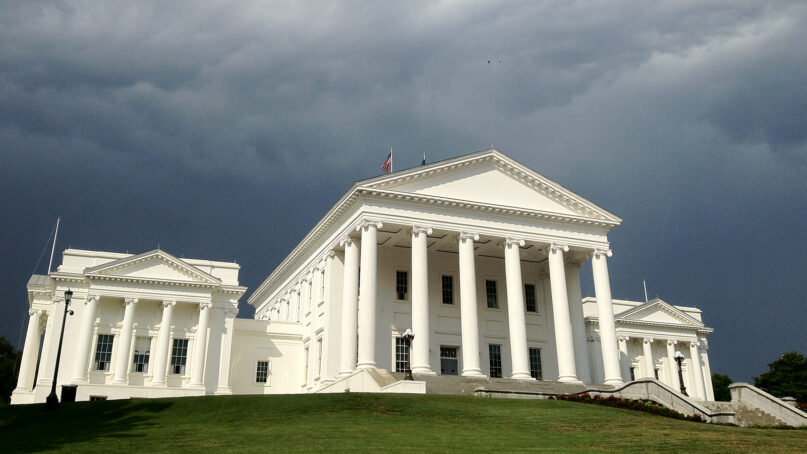(RNS) — The first recorded execution in the United States took place in 1608 in Virginia, when a man named George Kendall was executed for treason.
Since then, Virginia has executed nearly 1,400 people (1,390, to be exact). In recent history, since the Supreme Court allowed state executions to resume in 1976, Virginia has executed 113 people. Only Texas has executed more.
The state’s motto, found on its license plates, flags and billboards — “Virginia is for lovers” — is a noble aspiration, but the state’s reality is more brutal. The state used the electric chair as its preferred method of execution until the mid-1990s, 13 years after Texas became the first state to use lethal injection. Until the vote to abolish the death penalty on Friday (Feb. 5), electrocution was still an option.
RELATED: The hero of the film ‘Just Mercy’ could be you
But it’s worth celebrating Virginia, the “home of the Confederacy,” as the first state in the old Confederate South to abolish the death penalty. The two facts are related, because the death penalty cannot be separated from our history of race and slavery in America.
Just as we see an evolution from slavery to mass incarceration, we also see an evolution from lynching to state executions. The places where lynchings took place at the highest rate 100 years ago are precisely where executions continue to happen today. The states that held on to slavery the longest are the same states that have held on to the death penalty the longest.
Virginia has a special place in this history of racial terror. It was in Virginia where an enslaved Black woman was burned to death in 1737 and where a 16-year-old Black boy was electrocuted to death in 1916. The day Virginia voted to end its death penalty is the 70th anniversary of the execution of the last of the Martinsville Seven, a group of Black men convicted of rape by an all-white jury. (Until 1961, capital punishment for rape was effectively reserved for Black men.)
Those of us in other states have little reason to look down on Virginia, however. In 1950, Blacks made up about 10% of the general population in the U.S. but accounted for 75% of the executions. Today they comprise about 13% of the population but still make up almost half of death row (43%) and suffer more than a third of our executions.
More often than not, what determines who gets executed is not the atrocity of the crime but the race of the defendant and the race of the victim.
Most of these executions take place in the states of the former Confederacy, an area that also goes by the name “the Bible belt.” The death penalty has survived there, not in spite of Christians, but because of us.
But Virginia is the latest evidence that change is in the air. A majority of Americans, including young evangelicals and Catholics, now want to see the abolition of the death penalty. Executions drop nearly every year, and new death sentences are the lowest they’ve been in a generation. Almost every year a new state abolishes the death penalty.
RELATED: The 2020 election was a referendum on race and Christian faith
Joe Biden is one of the many people, like me, who has changed his mind on the death penalty. Legislation he championed 25 years ago contributed to the buildup of prisons and boosted the number of prisoners on the fed’s death row. In that same era we opened up the door to the federal executions we saw last year, when after 17 years without a single federal execution, Trump reignited the federal execution chamber, killing 13 people in less than a year — the most federal executions since the 1800s.
Now a new administration has an opportunity to make change happen. President Biden is poised to do the same thing Virginia just did: reckon with the mistakes of our past and use that past to help us envision a better future — one without the death penalty.
This is a time where we need courage, like the courage we saw in Virginia this week. Hopefully our federal government will have the courage to do the same.
(Shane Claiborne is an activist, author and co-director of Red Letter Christians. The views expressed in this commentary do not necessarily represent those of Religion News Service.)





